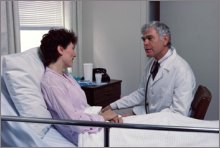Coronary Microvascular Syndrome (CMS): The Hidden Heart Attack Risk They STILL Aren't Checking For
by www.SixWise.com
As many as 3 million U.S. women may be unknowingly at risk
of heart disease because they suffer from coronary microvascular
syndrome (CMS), according to the National Heart, Lung, and
Blood Institute's (NHLBI) Women's Ischemia Syndrome Evaluation
(WISE) study.
|

Women who have chest pain yet an angiogram comes out
clear may still be at high risk of a heart attack if
they have coronary microvascular syndrome.
|
Women with CMS may have shortness of breath or chest pain,
but, upon visiting their doctor, be told nothing is wrong
and sent home. That's because CMS is not detected by an angiogram,
which is widely accepted as the best test for diagnosing heart
disease.
Unlike typical heart disease cases, in which accumulated
plaque in the large arteries shows up as bulky clogs, in CMS
plaque "evenly coats" the very small arteries of
the heart. The arteries are too small to appear on the angiogram,
much like "seeing a pine tree's branches but not its
needles," said Dr. George Sopko, a heart specialist at
the National Institutes of Health.
When these small arteries become narrowed, less oxygen is
able to flow to the heart, resulting in chest pain and a high
risk of heart attack. Further, coronary microvascular syndrome
also appears to affect the lining of the inner wall of the
artery, making the blood vessels not dilate correctly, according
to Dr. C. Noel Bairey Merz of Cedars-Sinai Medical in Los
Angeles, who led the WISE study.
According to WISE findings, about two-thirds of women with
chest pain receive a "clear" angiogram, yet half
of them actually have CMS.
CMS Mostly Affects Women
About 80 percent of patients with coronary microvascular
syndrome are women. "It appears to be primarily a woman's
problem, which is probably why we've missed it all these years
(that) we didn't bother to study women," said Bairey
Merz.
Heart disease, which is responsible for 480,000 deaths a
year, kills more women than men, and researchers are just
beginning to scratch the surface on how gender affects this
disease.
The WISE study, which began in 1996 and is ongoing, is one
such study aimed to help clear up this issue. It follows about
1,000 women with the goal of improving diagnosis and understanding
of heart disease in women. The women in the study had experienced
chest pain or other heart disease symptoms, yet showed no
evidence of clogged arteries after receiving an angiogram.
WISE Findings
The WISE study found that about 15 percent of all coronary
artery disease in women is coronary microvascular syndrome.
Other findings, according to Carl Pepine, chief of cardiovascular
medicine at the University of Florida and a WISE researcher,
include:
-
Only one-third of participants had obvious artery blockages.
Comparatively, in a similar group of men three-quarters
would have obvious blockages.
-
Of those without obvious blockages, over 50 percent had
abnormalities that could cause ischemic heart disease.
-
The rate of death or heart attack after four years among
those without obvious blockages was 10 percent, which
Pepine said was "much too high for somebody with
a normal coronary angiogram."
Women, Ask Your Doctor About CMS
"This study and the high prevalence of coronary microvascular
dysfunction demonstrate that we must think out of the box
when it comes to the evaluation and diagnosis of heart disease
in women," said NHLBI Director Elizabeth G. Nabel, M.D.
|

If you've had chest pain or shortness of breath, and
a clear angiogram, ask your doctor to rule out CMS.
|
If you are a woman and have experienced chest pain, shortness
of breath, fatigue or other symptoms of heart attack or heart
disease, yet an angiogram comes out clear, you should be prepared
to ask your doctor about CMS.
"It is no longer adequate to simply demonstrate open
arteries," Bairey Merz explained.
"The No. 1 message for women is, 'Pay attention to your
symptoms,"' said Sopko. "If you don't have visible
blockages, that doesn't mean you're not at risk."
However, many physicians may simply give you a clean bill
of health and send you home. "There are women who have
chest pain and we do all this testing and there's nothing
wrong -- and that's good," Bairey Merz said. "[But]
we need to stop falsely reassuring women unless we're willing
to do this additional work."
The additional work he's referring to includes more complicated
tests than an angiogram. One way to detect coronary microvascular
syndrome is to measure whether a person's arteries dilate
properly when injected with certain medications. Another is
to perform an MRI scan of the heart.
The researchers also recommended the following guidelines
for women who have chest pain, yet an angiogram does not show
any blockages:
-
Take a "functional capacity test." This is
a questionnaire, which cardiologists are well aware of,
that measures your difficulty level in performing everyday
activities. Those who pass an angiogram, yet get a low
score on this test, have an increased risk of heart attack,
according to WISE researchers.
-
Your doctor should avoid treadmill tests, as these do
not detect 40 percent of women with ischemic heart disease.
-
If you are a premenopausal woman with high blood pressure,
or an overweight woman of any age, you should be considered
at high risk of heart problems.
Recommended Reading
The
Four Most Common Hormone Disorders in Women
Get
Abdominal Pain, Diarrhea or Other Digestive Issues? It May
be Celiac Disease
Sources
CBS
News: Heart Disease Undetected in Many Women
National
Institutes of Health
California
Healthline: Heart Disease Often Undiagnosed in Women